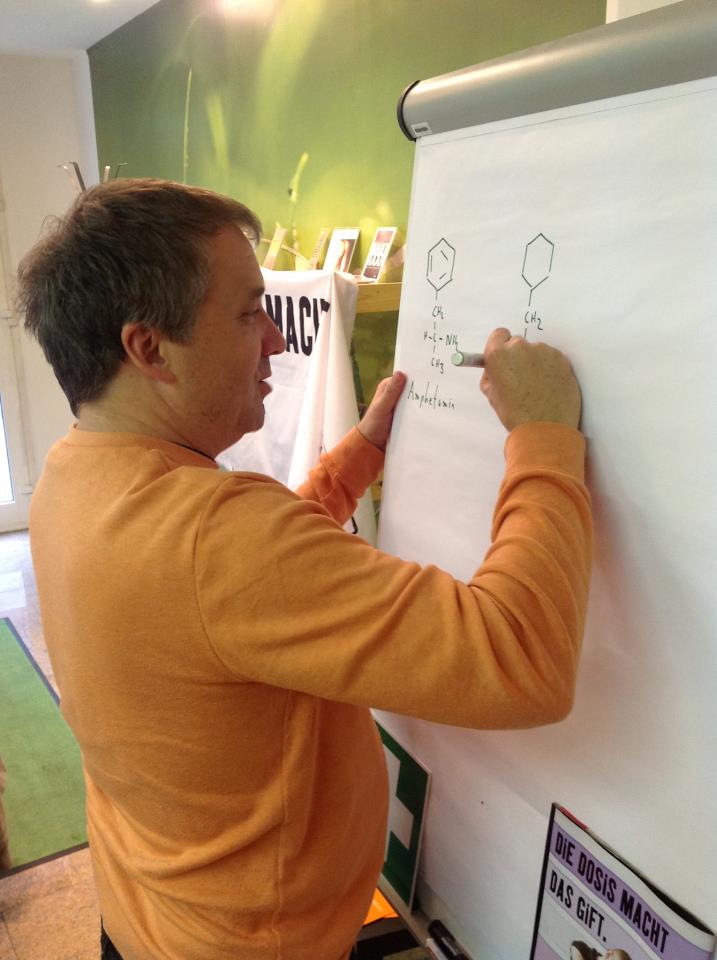The trade in them is booming: drugs to order from the Internet. The so-called research chemicals are sold as bath salts or rim polishes. The consumer is usually unable to understand what they really consist of. The health risks are high. Tibor Harrach is a pharmacist at Charité Berlin, specialising in toxicological studies. He is also co-founder of the Print Checking Initiative Berlin-Brandenburg. In an interview with Kriss Rudolph, he talks about the dangers of research chemicals.

What exactly are research chemicals?
Research chemicals are synthetic psychoactive substances. They are probably mainly produced in Asia - often deliberately to circumvent international drug control laws. Thanks to marketing via the Internet, they are in circulation worldwide. Every year, many new research chemicals come onto the market, and the number is increasing. In 2009, the European Monitoring Centre for Drugs and Drug Addiction (EMCDDA) reported 24 newly identified substances, in 2010 there were 41, in 2011 already 49. The Federal Centre for Health Education speaks of "one new drug per week".
So does the Internet facilitate access to such drugs?
It's very easy to get hold of RCs on the internet. They are offered there, for example, as "bath salts", "room fragrances" or "plant fertilisers" under imaginative product names and usually in colourful, attractively presented sachets - with explicit warnings against taking them. The composition of these preparations is usually unclear and varies greatly.
So the consumption of these substances is dangerous?
Obviously, the producers systematically search scientific databases for mind-altering substances from basic medical and pharmaceutical research. Although they know that these substances have a psychotropic effect, they do not know the health risks associated with their use. As a rule, there are also no studies on the metabolism of these substances, which means that no predictions can be made about the risks of interactions; this also applies to interactions between these substances and HIV medication. If such a novel synthetic drug is only metabolised via a metabolic pathway that is blocked by an HIV drug, for example, there is a risk of acute overdose.
And apparently you can't even be sure what the product contains.
No, unfortunately it is impossible to know which substances and how much of them are actually contained, as there are no quality controls. The so-called bath salt drugs and incense blends with synthetic cannabinoids in particular vary greatly in their composition. False labelling can also have fatal consequences: in 2009 there were two deaths in the USA and Denmark because a substance declared with the chemical structural formula and the scene name 2C-B-Fly actually contained Bromo-Dragonfly, which is around ten times as strong as 2C-B-Fly. Unfortunately, unlike in the Netherlands, Austria or Switzerland, Germany does not offer the possibility of drug testing, i.e. the chemical analysis of such RCs. Consumers are simply allowed to run an avoidable risk.
How widespread are research chemicals actually?
As far as suppliers are concerned, the EU Commission identified 136 online shops in 2010, most of them in the Netherlands, the UK and Germany.
According to a Eurobarometer study published in 2011, an average of one in twenty young Europeans between the ages of 14 and 25 have had experience of using legal psychoactive substances. The leader was Ireland with 16 per cent, followed by Poland and Latvia with nine per cent each and the UK with around eight per cent. Germany was in the middle with 3.7 per cent. Twice as many of the users were male, they mostly lived in large cities and were predominantly over 18 years old.
Are research chemicals illegal?
RCs belong to the so-called legal highs. In Germany, consumption-related acts such as possession and purchase are not punishable by law. However, the products are regularly classified by German courts as questionable and unauthorised drugs, and their distribution is generally punished with high penalties.









